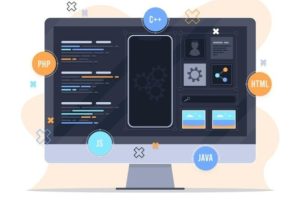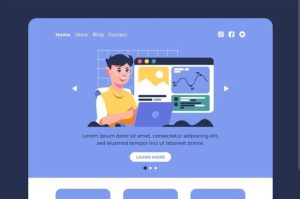Web Framework is software designed to support web application development. Includes web services, web resources, and web APIs. Namely, websites that are independently based. Of course, you need to use a server to store the database. Meanwhile, building a website requires coding and programming skills. Next, the appearance of the site requires UI/UX design skills.
Moreover, Web Framework have various types. Both specifically and in general. This time we will discuss the general category in the article. Of course, it is related to the type of work method and position. So, for more details, check our UpGes presentation below, Guys!
Full-Stack Web Framework
Full-Stack Web Framework provides everything a Developer needs. Use, to build complete web applications. Both from the front-end and back-end. So, here are some types, including:
- Django (Python)
Excess:
Provides complete features. These include: ORM (Object-Relational Mapping), authentication, administration, and many more.
Has many built-in security features. These include CSRF protection, XSS, SQL Injection, etc.
Facilitates a large community, and good documentation.
Lack:
Monolithic, can be too heavy for small projects.
The Learning Curve has a fairly high learning curve.
- Ruby on Rails (Ruby)
Excess:
Convention Over Configuration. Rails has_many default settings, which makes development easier.
Productivity, lots of Gems (Plugins) that can be used. In order to speed up development.
Strong community and documentation.
Lack:
Performance can be slower, compared to other frameworks.
Major updates, sometimes requiring significant refactoring.
- Laravel (PHP)
Excess:
Elegant, expressive syntax.
Many varied built-in features. These include authentication, ORM, database migration, and others.
Excellent documentation, and a great community.
Lack:
Can be too complex, for small applications.
Performance can be lower, compared to other frameworks.
Web Framework Micro
Web Framework Micro focuses on simplicity, and provides basic functionality. Allows developers to add other features as needed. So, here are some types, including:
- Flask (Python)
Excess:
Light and flexible.
Easy to learn and use.
Suitable for small applications, and prototyping.
Lack:
Less built-in features, so more manual configuration.
It can take more time to build large applications.
- Express.js (Node.js)
Excess:
Very flexible and fast.
Supports middleware that allows, easily adding functionality.
Large community, and lots of modules.
Lack:
The learning curve can be steep, for Node.js beginners.
Lacking structure, it can be difficult to organize large applications.
API-Only Web Framework
This Web Framework is specifically for creating APIs. Typically, it also uses RESTful or GraphQL. So, here are several types, including:
- Express.js (Node.js)
Excess:
Fast and light.
Easy to create, RESTful API.
Many middleware modules are available.
Lack:
Requires more, manual settings.
The learning curve can be steep for beginners.
- FastAPI (Python)
Excess:
Very fast and efficient.
Full support for Python type hints.
Automated documentation using Swagger and Redoc.
Lack:
Relatively new. So, the community and ecosystem are not as big as other frameworks.
Documentation could be better for other frameworks.
Front-End Web Framework
The Front-End Web Framework is used for user interface development and user interaction. Of course, there are various types. So, here are some examples that are popularly used, including:
- React
React is a framework, developed by Facebook. Focuses on,creating component-based user interfaces.
- Angular
Developed by Google, offers a complete solution. For the sake of building a single-page web application.
- Vue.js
A progressive framework that can be adopted,incrementally in web projects.
Back-End Web Framework
Web Framework Back-End is used for development of server logic. Moreover, for database management and handling HTTP requests. So, here are some examples that are popularly used, including:
- Django
A Python framework that focuses on development speed and ease of use.
- Ruby on Rails
A Ruby framework that emphasizes conventions, rather than configuration.
- Laravel
PHP framework that provides various features. These include routing, authentication, and easy database management.
That’s the article from Us UpGes which discusses Web Framework. Regarding the various types in general. So, it can be useful for you readers. Of course, to understand the world of web development further. It is important for those of you who want to seriously enter this field. OK Guys, that’s all from us and thank you.





